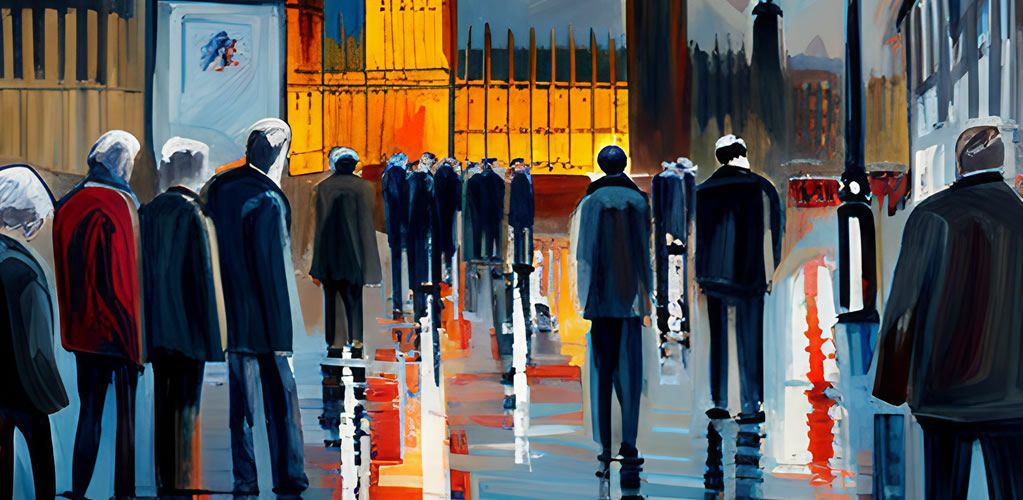Assault rifles, wind farms, immigration and hormones: Inside NatCon
The recent National Conservatism conference in the UK attracted a mostly male audience, with focus on immigration, gun ownership, and anti-clean energy sentiments.

The recent National Conservatism (NatCon) conference in the UK attracted a mostly male audience, with focus on immigration, gun ownership, and anti-clean energy sentiments.
📌 The main points...
- Over 300 people, mainly male, attended the National Conservatism (NatCon) conference last week.
- Key topics: immigration, gun ownership, anti-clean energy, trans rights.
- Numerous conservative think tanks were represented.
- The conference was organised by the US think tank Edmund Burke Foundation.
W hile the National Conservatism conference has been making headlines – for reasons ranging from admissions of gerrymandering to calls for delegates to breed – it’s been quite publicity-shy with journalists. openDemocracy was one of at least three left-leaning outlets whose application to cover the conference was refused.
But I managed to blag my way in anyway.
And once inside, I saw no shortage of whackadoodlery. ‘Deep State’ conspiracy theories were alive and well, as a man in a crumpled linen suit rose to his feet to declare: “One of the reasons Liz Truss was removed as prime minister was that her government was going to move against the Net-Zero agenda!” He offered no supporting evidence.
What I found more interesting was the feel of the place. Over 300 delegates, packed into a plush, wood-panelled hall in Westminster. The mood was angry, but comfortable. These were normally shy conservatives, glad to be among like minds, where they could speak freely.
For a ‘national’ conservatism conference in Britain, it was more Trump rally than Sunak conference. The crowd was almost entirely male, and younger than might be expected. In fact, as a 38-year-old, I couldn’t find anyone my own age – it looked like about 80% were under 30, and the other 20% over 50. One man next to me had dragged along his clearly bored girlfriend, who audibly harrumphed through several speeches.
Standard dress was blazers, tweeds, waistcoats, Union Jack bow ties, and summer dresses. In fact, there were more neckties than I’ve seen anywhere since the pandemic. This wasn’t a political convention; it was the Chap Olympiad.
It was a diverse audience, they assured us. Earnest young men introduced themselves as students from both Oxford and Cambridge. But they were not all Oxbridge types. One member of the audience piped up that he was attending the elite $78,000-a-year private Williams College, in Massachusetts.
The ‘red wall’ voters who featured so prominently in rhetoric didn’t appear to be terribly well-represented among the evidently affluent delegates, many of whom had flown in internationally, their airline labels still affixed to the luggage piled up by reception, as delegates introduced themselves as being from Pennsylvania, California, Copenhagen and Brussels. So much for anti-globalisation.
Still, there is an honesty about the conference: delegates and speakers didn’t really seem to care how they came across. A look at the speeches bears this out. “The ‘mad person’ is the apex individual!” declared writer and philosopher Nina Power, to an audience that lapped it up. Quite a few of them seemed keen to play the ‘mad person’.
What got them going
Most revealing were the bursts of applause. Energetic, prolonged, tub-thumping applauses whenever somebody said something that really struck a chord. It was instructive to see what pressed their buttons.
Immigration was the hottest topic – a guaranteed crowd-pleaser every time. In fact, delegates seemed inordinately interested in it, with outbursts of “oooooh” and “hear, hear” at every mention.
Someone who worked for the hard-right YouTube channel Triggernometry complained: “The left doesn’t distinguish between legal and illegal immigration! That’s what’s happened to people I know, particularly [in] London.” Mentions of London, or big cities, were often accompanied by a hiss.
Another barnstorming topic was gun ownership. When recently elected Trump-backed senator JD Vance of Ohio mentioned that he attended a raffle event where the prize was an AR-15 assault rifle, a prolonged ripple of applause broke out.
Nina Power’s declaration that “I strongly recommend everyone goes to church” also got a rapturous reception, suggesting that the “faith” part of the old far-right rallying cry of ‘Faith, Flag and Family’ is alive and well.
Clean energy and wind farms were a popular object of anger. Vance – who opposes US support for Ukraine – still gave the war as a reason for countries to stick to “coal and gas”, invoking populist tropes against wind farms: “I don’t want to live in some post-apocalyptic hellscape filled with dead birds!”
The subject of trans people’s rights was another favourite bogeyman, as speakers queued up to ridicule “hormones” and trans people themselves, with repeated references to so-called “basic biology”.
Meanwhile, Frank Furedi, a former leader of the Revolutionary Communist Party, who has now seamlessly moved to the far right, told the audience that the conservative cause was “civilisational… there’s so much at stake… it’s existential.”
And, curiously, the most quoted political thinker was Karl Marx. More Marx was cited than at any Corbyn-era Labour Party conference. Delegates seemed obsessed with the idea that Marx lurks behind every corner.

Curiously, the most quoted political thinker was Karl Marx. More Marx was cited than at any Corbyn-era Labour Party conference. | CREDIT: JASPER
Think tanks
Not all of the delegates were slightly awkward young men from Oxbridge and private liberal arts colleges in the US.
Many introduced themselves as working for conservative think tanks. This makes sense, for the ‘national’ conservatism conference in the UK is in fact organised by the Edmund Burke Foundation, a US think tank.
Among the many think tanks represented were the Bow Group, the Centre for Digital Assets and Democracy, the Alliance for Responsible Citizenship (an offshoot of the Legatum Institute), and the Hungarian-state-funded Danube Institute – one of the few civil society organisations the Orbán government has not cracked down on, but has instead propped up.
Talk was rife, on and off the stage, of “Anglosphere conservatism” – code for stage two of Brexit, with deepening relations with the hard right.
Media management
Perhaps surprisingly, given its shambolic public image, the conference has a professionally organised social media presence. It’s just that none of the curators seems to think there’s anything amiss with what is being said.
Organisers film the proceedings, transcribing highlights, while monitoring Twitter and Facebook mentions in real-time, along with a WhatsApp channel.
The conference itself has been tweeting carefully curated highlights of some speeches. (See Douglas Murray declaring, “There was nothing wrong with nationalism in Britain, it’s just that there was something wrong with nationalism in Germany. I don’t see why no one should be allowed to love their country because the Germans mucked it up twice in a century.”)
Of course, one of the two reception desks was marked ‘media’. Given how many journalists had been kept out, perhaps that should have been marked ‘desk for excluding media’.
Is this the future of the right? They certainly think so. Professor Tim Bale has warned elsewhere, though, that this risks being a “cul de sac” for British conservatives – of great interest to the activist base, but navel-gazing over issues that leave most voters baffled, or even alienated.
This is a strand of the right that enjoys seeing itself as a popular insurgency, against the old boys’ club of Westminster politics, the heirs to UKIP and Brexit. But meeting in a prestigious Westminster venue, they did not seem to practise what they preached.
In fact, all it took for me to get in, free of charge, despite my not having booked, was my plummy accent, a blazer, a Panama hat, and old college cufflinks. Deference quickly kicked in, and they were tugging at their forelocks to show me in, imagining me to be one of their own. This was about as ‘establishment’ a gathering as you could imagine.

GOING FURTHER:
— AUTHOR —

|
▫ Seth Thévoz, political, cultural and social historian, whose specialisms include the history of British political finance.. |

|

|

|
Sources
▪ Text: This piece was originally published in openDemocracy and re-published in PMP Magazine on 21 May 2023. This article is published under a Creative Commons Attribution-NonCommercial 4.0 International licence. | The author writes in a personal capacity.
▪ Cover: Jasper. (Licensed under a Creative Commons Attribution-ShareAlike 4.0 International License.)






[Read our Comments Guidelines]